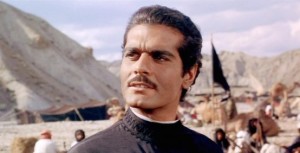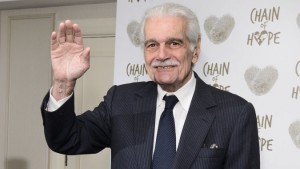Omar Sharif was a man of whom it can fairly be said, courtesy of Shakespeare’s The Tragedy of Macbeth:
Nothing in his life became him like the leaving it.
 More to the point, paraphrasing another famous saying, never before in the history of film has an actor with so much talent ended up having so little to show for it. Frankly, it’s pitiful that all one can cite to commend his whole life is the supporting role he played in (Peter O’Toole’s) Lawrence of Arabia (1962) and the lead role he played in Doctor Zhivago (1965).
More to the point, paraphrasing another famous saying, never before in the history of film has an actor with so much talent ended up having so little to show for it. Frankly, it’s pitiful that all one can cite to commend his whole life is the supporting role he played in (Peter O’Toole’s) Lawrence of Arabia (1962) and the lead role he played in Doctor Zhivago (1965).
Mind you, IMDb credits Sharif with playing 117 roles during his 61-year career. Yet, for all the posthumous accolades he’s receiving, the only acting awards he ever won were Golden Globes way back in the 1960s – for the roles referenced in the paragraph above, respectively.
Here, for the most part, is why:
He became an inveterate gambler, touring the casino tables of Europe, frittering away his fortune, which he had to replenish by taking uninspiring roles as the ‘foreign gentleman’ or ‘exotic lover’ in a string of forgettable films…
He gave up roulette after losing £750,000 in a single night, but continued to leach money as only a gambling addict knows how…
It wasn’t just lovers he sometimes behaved shamefully towards; he had a violent temper, once being arrested for smashing up a restaurant in Greece.
(Daily Mail, July 10, 2015)
In fact, Sharif’s bacchanalian behavior off screen became such tabloid fodder during the last decades of his life, it overshadowed any role he played (or had ever played) on screen. By way of analogy, you’d never know Lindsay Lohan was once considered the most promising actor of her generation, given the tabloid fodder her drug-addled behavior off screen has become.
Not to mention how much good he could have done for underprivileged kids in his native Egypt if he had used his fame and just a fraction of his gambling losses to do for them what fellow actor Paul Newman did for seriously ill kids in America. (The Hole in the Wall Gang and Newman’s Own Foundation are just two of the latter’s charitable legacies.)
This is why I felt so incredulous that public figures and personal friends were eulogizing Sharif for being an accomplished actor and admirable man in equal measure. Some of what I heard and read was replete with so much idle flattery, it bordered on idol worship. I could not help but think that people were confusing the few dashing characters he played with the reprobate character he was.
 Which brings me back to my Shakespearean allusion above. For, to his credit, Sharif performed his own version of “deep repentance” during the final years of his life; that is, by speaking with refreshing and disarming honesty about squandering his acting abilities just to live a decadent, depraved and dissolute life.
Which brings me back to my Shakespearean allusion above. For, to his credit, Sharif performed his own version of “deep repentance” during the final years of his life; that is, by speaking with refreshing and disarming honesty about squandering his acting abilities just to live a decadent, depraved and dissolute life.
Indeed, he seemed anxious to confess that he threw away the thing others thought was his saving grace “as twere a careless trifle.” Accordingly, he would probably be far more disdainful of than flattered by any posthumous accolade.
I got the sense from interviews he gave that he regarded his as a misspent life others should learn from; not as a charmed life others should emulate. Yet the fatally flawed character of this man was such that he invariably undermined his apparent reckoning by admitting that, if he could do it all over again, he would not change a thing….
Sharif died on Friday of the ravages of Alzheimer’s and a heart attack. He was 83.
Farewell, Omar.